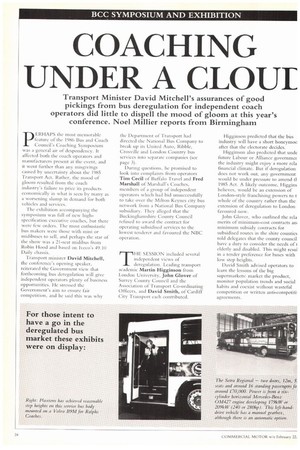COACHING
Page 24

If you've noticed an error in this article please click here to report it so we can fix it.
UNDER A ciour
Transport Minister David Mitchell's assurances of good pickings from bus deregulation for independent coach operators did little to dispell the mood of gloom at this year's conference. Noel Millier reports from Birmingham
PERHAPS the most memorable feature of the 1986 Bus and Coach Council's Coaching Symposium was a general air of despondency. It affected both the coach operators and manufacturers present at the event, and it went fiirthur than any misgivings caused by uncertainty about the 1985 Transport Act. Rather, the mood of gloom resulted from the coach industry's failure to price its products economically in what is seen by many as a worsening slump in demand for both vehicles and services.
The exhibition accompanying the symposium was full of new highspecification executive coaches, but there were few orders. The most enthusiastic bus makers were those with mini or midibuses to sell, and perhaps the star of the show was a 21-seat midibus from Robin Hood and based on Iveco's 49.10 Daily chassis.
Transport minister David Mitchell, the conference's opening speaker, reiterated the Government view that forthcoming bus deregulation will give independent operators plenty of business opportunities. He stressed the Government's aim to ensure fair competition, and he said this was why
the Department of Transport had directed the National Bus Company to break up its United Auto, Ribble, Crosville and London Country bus services into separate companies (see page 3).
During questions, he promised to look into complaints from operators Tim Cecil of Buffalo Travel and Fred Marshall of Marshall's Coaches, members of a group of independent operators which had bid unsuccessfully to take over the Milton Keynes city bus network from a National Bus Company subsidiary. They alleged that the Buckinghamshire County Council refused to award the contract for operating subsidised services to the lowest tenderer and favoured the NBC operation.
THE SESSION included several independent views of deregulation. Leading transport academic Martin Higginson from London University, John Glover of Surrey County Council and the Association of Transport Co-ordinating Officers, and David Smith, of Cardiff City Transport each contributed.
Higginson predicted that the bus industry will have a short honeymoc after that the electorate decides.
Higginson also predicted that uncle future Labour or Alliance governmcr the industry might enjoy a more rcla financial climate. But if deregulation does not work out, any government would be under pressure to amend a. 1985 Act. A likely outcome, Higgins believes, would be an extension of London-style franchising powers to t whole of the country rather than the extension of deregulation to London favoured now.
John Glover, who outlined the rcla merits of minimum-cost contracts an minimum subsidy contracts for subsidised routes in the shire counties told delegates that the county council. have a duty to consider the needs of t elderly and disabled. This might resul in a tender preference for buses with low step heights.
David Smith advised operators to learn the lessons of the big supermarkets: market the product, monitor population trends and social habits and coexist without wasteful competition or written anti-competiti• agreements.
























































